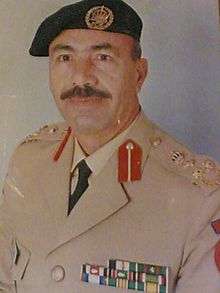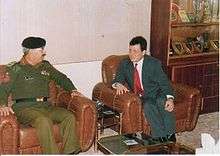Waleed A. Samkari
| Waleed Ahmad Samkari | |
|---|---|
 | |
| Born |
1942 Irbid, Jordan |
| Service/branch | Jordanian Army (Maintenance corps) |
| Years of service | 1972-1996 |
| Rank | Brigadier General |
| Commands held | Commander of royal maintenance corps. |
| Awards | Independence medal (1976), Al-Nahda medal (1992), Training proficiency insignia (1994) |
Brigadier General Waleed Ahmad Samkari (العميد وليد أحمد السمكري), Director of the Royal Maintenance Corps (سلاح الصيانة الملكي) of the Jordanian Armed Forces responsible for supporting continuous operations for the military.[1] During his command, his unit underwent a change in adopting modern military organization. Samkari helped with getting the ZSU-23-4 "Shilka" and the 9K33 Osa from Russia and the former Soviet Union. He influenced improving military collaboration between Jordan and Turkey. He had been educated in Turkey and was fluent in the language.
Early life
Samkari was born in Irbid in 1942. He was educated there and finished high school when he was 16. He then enrolled in college in Turkey in 1959.
Education
Samkari attended Istanbul Technical University(1959–1965) where he received his undergraduate and graduate degrees in mechanical engineering. He then worked on an irrigation project north of Jordan where he witnessed an aerial battle between Israeli and Syrian fighter jets in the 6 day war in 1967. He resolved at that time to one day join the military. He moved to work in Kuwait for a few years.
After he joined the army in 1972, the military sent Samkari for several educational courses in England and the United States including Fort Lee (Virginia) in 1988, where he received his second master's degree from the Florida Institute of Technology. He had several courses in Fort Lee. and he was engaged in military cooperation with the United States.
Military career
Samkari entered the service in 1972 He was He started working in the Maintenance Corps warehouses that were responsible for supplying the military with spare parts. He was sent to the United States in order to get training in leadership and management.

After Major General Abdilwahab Kharabsheh retired as maintenance corps commander, King Hussein promoted Samkari to Brigadier General and commander of the corps in 1992. Samkari's role as director came at a sensitive time. After the Gulf War, the face of the middle east had changed. Samkari reused parts and reassembled them, due to the shortage of spare parts. That changed by the time of the start of the peace talks between Jordan and Israel. By that time Jordan had started an era of sophisticated military force.
Role in military improvement
General Samkari was a member of the envoy to the Soviet Union which acquired Russian made anti aircraft weaponry, the ZSU-23-4 "Shilka" and the 9K33 Osa missiles and targeting radar. He also was sent to the United Kingdom to gain support for various British built weaponry in Jordan. Samkari was also sent to the United States several times in order to take courses to improve the Jordanian military in Fort Lee (Virginia).